A NIGHT OF MAJESTY
Giacomo Puccini‘s magnum opus Turandot was posthumously completed by his compatriot Franco Alfano. This opera, which premiered at La Scala in 1926 under the baton of Arturo Toscanini, signifies the swan song of the Italian operatic movement, a tradition tracing its roots back to the early baroque compositions of Peri and Monteverdi. Renowned for its opulent orchestration, Turandot is a testament to Puccini’s mastery in weaving the musical innovations of Wagner, Strauss, and Debussy into his quintessentially Italian tapestry of sound. The opera is equally famed for its vocally demanding arias, particularly the celebrated tenor piece “Nessun Dorma.”
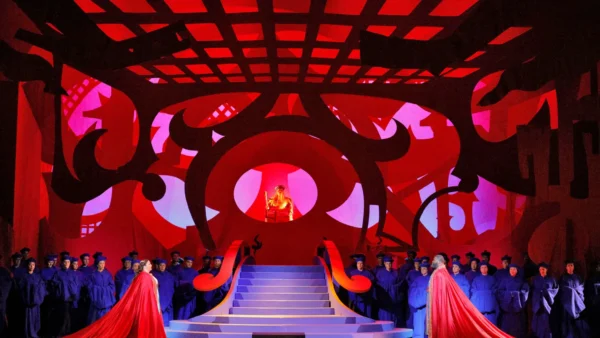 Angela Meade (Turandot), Russell Thomas (Calaf)
Angela Meade (Turandot), Russell Thomas (Calaf)Los Angeles Opera’s Turandot, which opened last night at the Dorothy Chandler Pavilion, is a resounding success, immersing audiences in a mélange of artistic splendor and vocal magnificence that elevates the experience to extraordinary heights. David Hockney‘s imaginative sets and vibrant staging, coupled with the star performances of Angela Meade and Guanqun Yu, breathe life into the epic tale with emotional depth and aesthetic grandeur that is nothing short of breathtaking. This production not only pays homage to the grand tradition of Italian opera but also enhances it, offering an experience that lingers long after the final curtain. An evening of opulent visuals and exquisite sonority, this Turandot is an operatic banquet that should not be missed.
Angela Meade (Turandot)
Turandot stands as both the zenith of traditional Italian opera and a harbinger of avant-garde artistic expressions, encapsulating a fusion of decadent splendor and robust vitality, I consider it to be the crowning achievement of the Italian operatic canon.
Russell Thomas (Calaf)
Russell Thomas (Calaf) and Ashley Faatoalia (Emperor)
The narrative unfolds around the icy Princess Turandot, who proclaims that any suitor seeking her hand must first unravel three enigmas, with failure resulting in death. Calaf, an enigmatic prince, becomes smitten with Turandot and triumphs in the riddle challenge. Yet, touched by her anguish, he presents her with an escape clause: should she divine his name by dawn, his life shall be forfeit.
Morris Robinson (Timur), Russell Thomas (Calaf) and Guanqun Yu (Liu)
The 1992 debut of David Hockney’s interpretation of Turandot at the Lyric Opera of Chicago garnered widespread acclaim, and its popularity has been reaffirmed by audiences and critics alike in San Francisco, London, and Toronto. His artistic vision for is an extraordinary feat, capturing the essence of the opera’s grandeur and enigma. His design infuses the stage with a vibrancy and theatrical flair that harmonizes with Puccini’s intense score, creating a visual feast that augments the dramatic narrative.
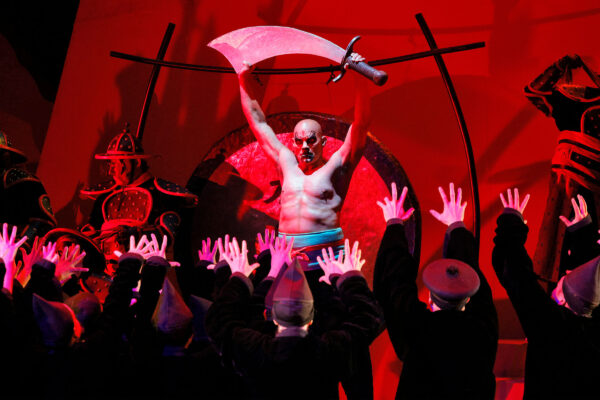 Lawrence Dillard (Executioner)
Lawrence Dillard (Executioner)Hockney’s sets are a visual banquet, marked by audacious hues and bold geometric forms that conjure a realm both fantastical and steeped in history. Drawing inspiration from traditional Chinese artistry, Hockney reinterprets these motifs with his signature flair. The palette of deep blues, vivid reds, and lush greens crafts a visual tapestry that transports the audience to an imagined Beijing. Hockney’s sets impress with their ability to captivate the eye while serving the opera’s action, their grand scale reinforcing the imperial majesty and the ominous nature of Turandot’s riddles.
Thomas J. Munn‘s original lighting design is executed by Gary Marder with finesse, harmonizing with the sets to amplify the narrative’s emotional and dramatic arcs. Munn’s lighting transcends mere utility, employing chiaroscuro to highlight the angularity of the set and imbue the stage with depth. The nuanced lighting transitions adeptly modulate the atmosphere, from the chilling obscurity of the riddle scenes to the warm luminescence of the romantic interludes. This dynamic lighting delineates the characters’ psychological intricacies, particularly Turandot’s frosty exterior and Calaf’s fervent resolve.
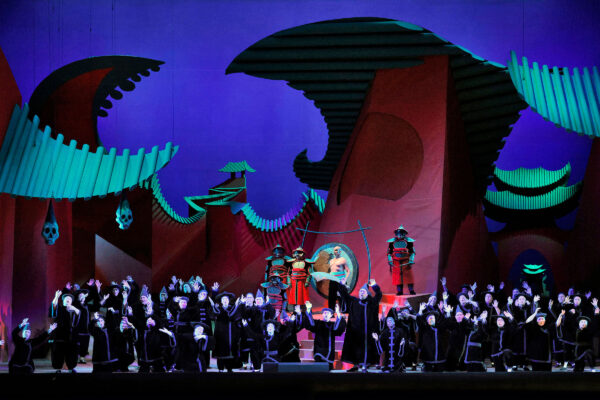
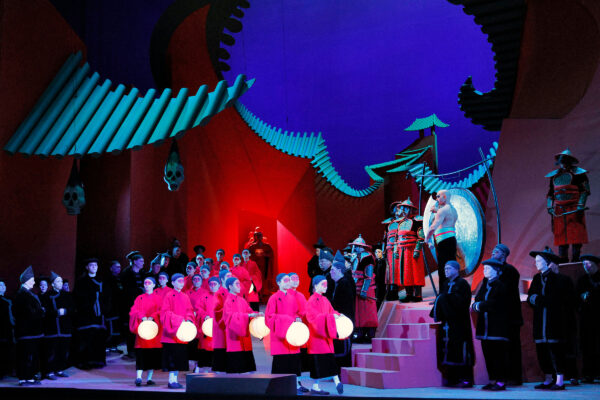 The Ensemble and Los Angeles Children's Chorus
The Ensemble and Los Angeles Children's ChorusAs reimagined by Bruce Garnett, Hockney’s staging is both innovative and captivating, ensuring that the visual elements bolster the storytelling (Ian Falconer designed the lush costumes). The direction skillfully utilizes the space, with character placement accentuating isolation or dominance as the scene demands. The staging shines during ensemble scenes, where the chorus becomes an integral component of Hockney’s visual tableaux. Kitty McNamee‘s choreography and Andrew Kenneth Moss‘s fight movement are orchestrated to guide the audience’s gaze seamlessly across the stage, fostering an immersive experience in the unfolding drama.
Scene from Act I
Russell Thomas, in the role of Calaf, delivered a performance of commitment and vocal richness. His rendition of “Nessun Dorma” resonated with warmth. Yet, it was apparent that his moderately sized tenor voice is better suited to smaller venues than the acoustically challenging and cavernous Dorothy Chandler Pavilion.
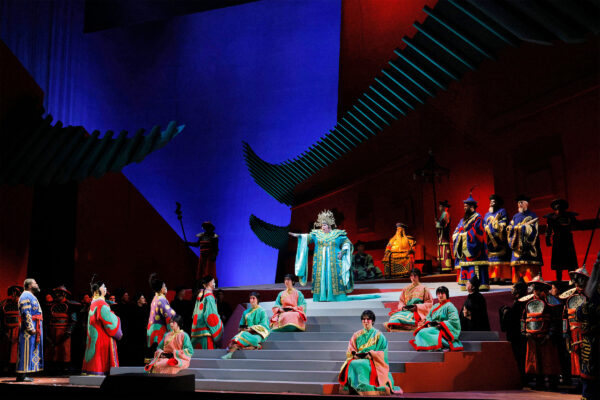 Angela Meade (center) as Turandot
Angela Meade (center) as TurandotAngela Meade, in her inaugural portrayal of Turandot, exhibited formidable vocal prowess and dramatic fervor. She adeptly captured the princess’s frigid heart with a riveting performance. Her voice, commanding and soaring over the orchestra, shone particularly during the opera’s climactic junctures. Meade’s Turandot transcended mere aloofness, revealing layers of vulnerability. Her execution of “In questa reggia” was striking, masterfully conveying Turandot’s complex emotions and regal contempt, ensuring we were attuned to every subtlety of her transformation.
 Guanqun Yu (Liù)
Guanqun Yu (Liù)Guanqun Yu, as the slave girl Liù, was the unequivocal highlight of the third act, if not the entire opera. Liù’s unwavering loyalty to Calaf and her steadfast defiance against Turandot’s cruelty culminated in the evening’s most poignant performance. Yu’s voice embodied the weight of a weary sufferer, the resolve of a devoted caretaker, and the urgency of a woman facing her demise. Her performance of “Tu che di gel sei cinta” was heartrending. Morris Robinson, portraying Timur, offered a performance imbued with pathos, embodying the fallen monarch with verisimilitude.
 Guanqun Yu (Liù) and Morris Robinson (Timur)
Guanqun Yu (Liù) and Morris Robinson (Timur) Morris Robinson (Timur)
Morris Robinson (Timur)In the roles of the emperor’s ministers Ping, Pang, and Pong, Ryan Wolfe, Terrence Chin-Loy, and Julius Ahn, respectively, infused their characters with three-dimensional humanity, a welcome evolution from the historically caricatured portrayals of these figures.
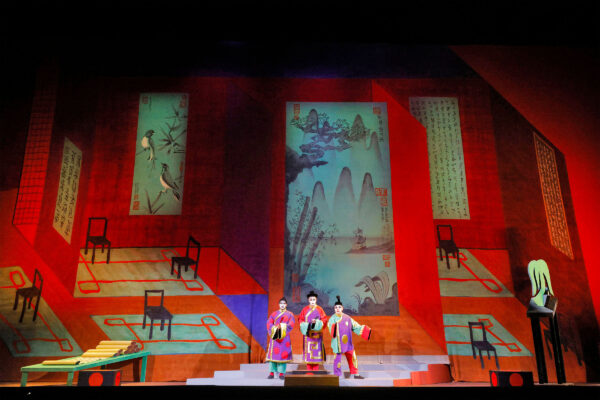 Terrence Chin-Loy, Ryan Wolfe, and Julius Ahn
Terrence Chin-Loy, Ryan Wolfe, and Julius Ahn Terrence Chin-Loy, Julius Ahn and Ryan Wolfe
Terrence Chin-Loy, Julius Ahn and Ryan WolfeJames Conlon‘s orchestral leadership was nothing short of exemplary. His meticulous attention to the score illuminated its symphonic elements and heightened the dramatic moments with precision. His interpretation was both intricately crafted and richly nuanced, ensuring the orchestra’s volume supported rather than overwhelmed the vocalists.
Angela Meade (Turandot), Russell Thomas (Calaf) and Ashley Faatoalia (Emperor)
The superb chorus, under Jeremy Frank’s direction, emerged as a formidable entity, its presence both palpable and profound. It served not merely as a collective voice but as a dynamic character, oscillating between a thirst for retribution, a font of empathy, and an observant commentator offering poignant reflections. Fernando Malvar-Ruiz led the Los Angeles Children’s Chorus.
Alan Williams (Mandarin)
photos by Cory Weaver / LA Opera
Turandot
LA Opera
Dorothy Chandler Pavilion, 135 North Grand Ave.
ends on June 8, 2024
for tickets, call 213. 972.8001 or visit LA Opera
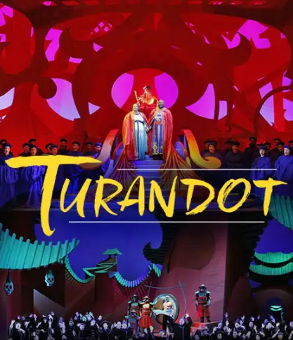
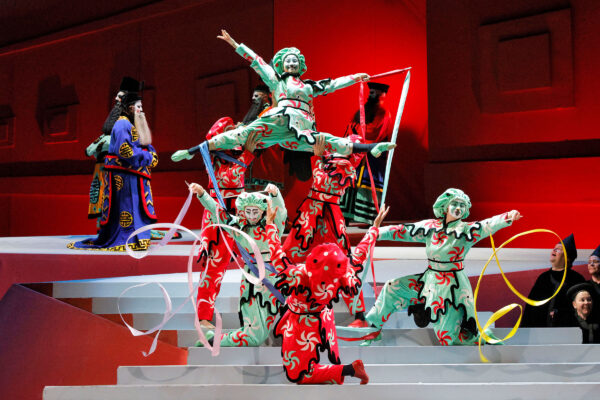

{ 1 comment… read it below or add one }
I was lucky enough to catch closing night and it was magnificent. The Hockney sets alone were worth the price of admission. The depth and breath of them was dumbfounding. The colors, layers, forced perspectives, and angles never gave your imagination a chance to rest. The lighting and costumes excelled as well creating an all round feast for the eyes. Guanqun Yu’s Lui stole the night with her Act 3 lament of love and sacrifice. Angela Meade as Turandot was everything you imagine an old time Opera Diva to be …. bigger than life, emotionally devastating, and overwhelmingly commanding. Russell Thomas as Calaf never rose to the heights the women achieved and while his performance was serviceable and by no means an embarrassment he was swallowed up by Dot’s Place and his big…everyone is waiting for it…last note of Nessum Dorma just fizzled. The Emperor’s ministers Ping, Pang, and Pong, played by Ryan Wolfe, Terrence Chin-Loy, and Julius Ahn added just the right amount of playfulness to counteract all the beheading. At times there were over 100 singers on stage and they soared. Even when they were singing off-stage and providing mood setting background they were hypnotizing. The orchestra really got to run the musical gambit from mystery and doom to pageantry and splendor and engulfed the audience. A real triumph for L.A. Opera!